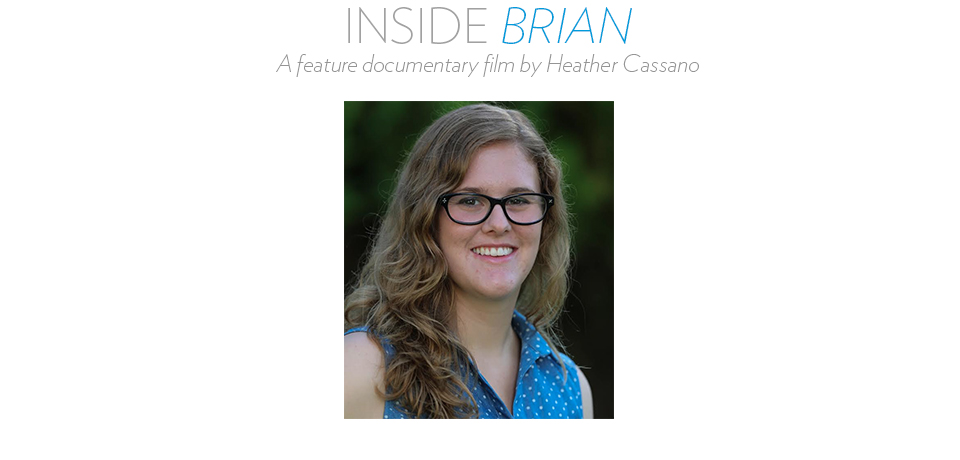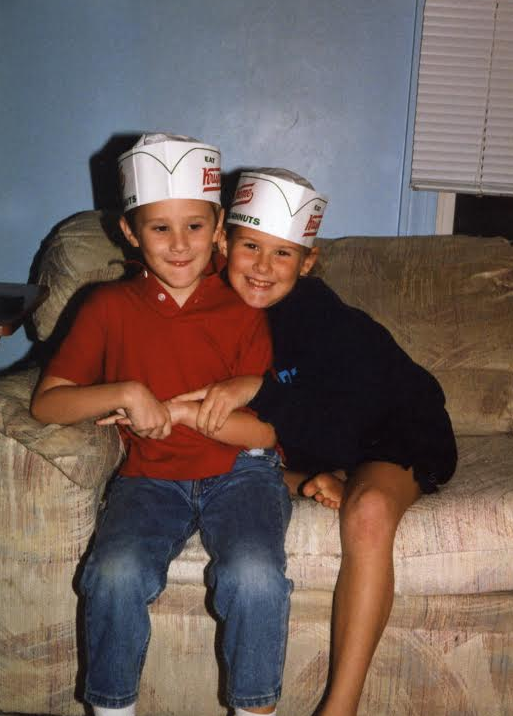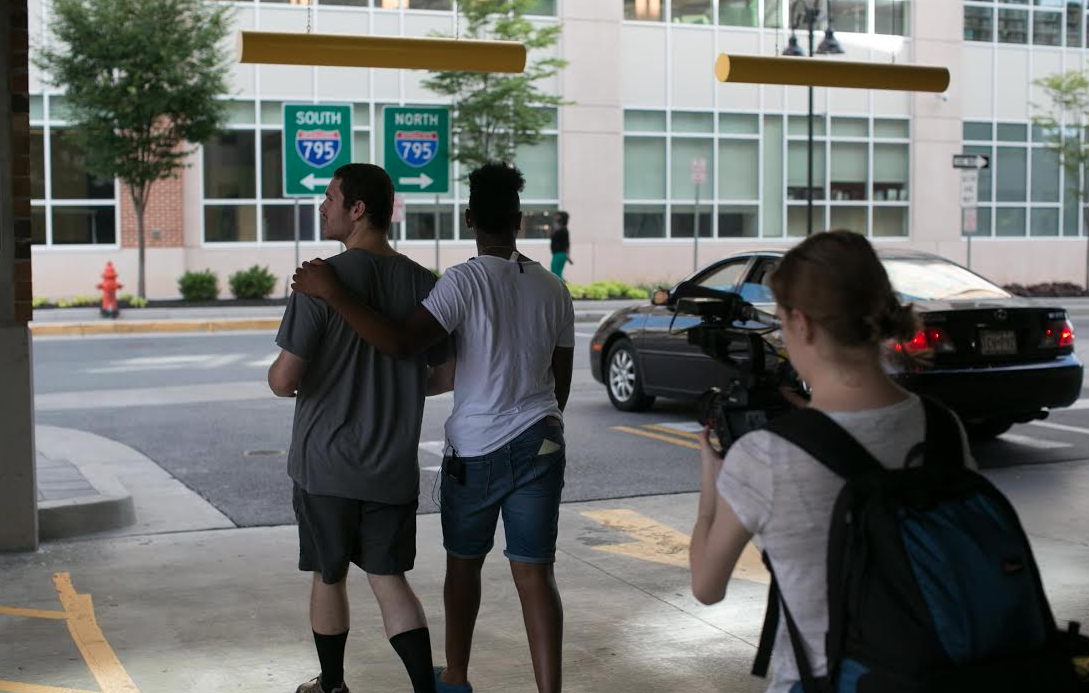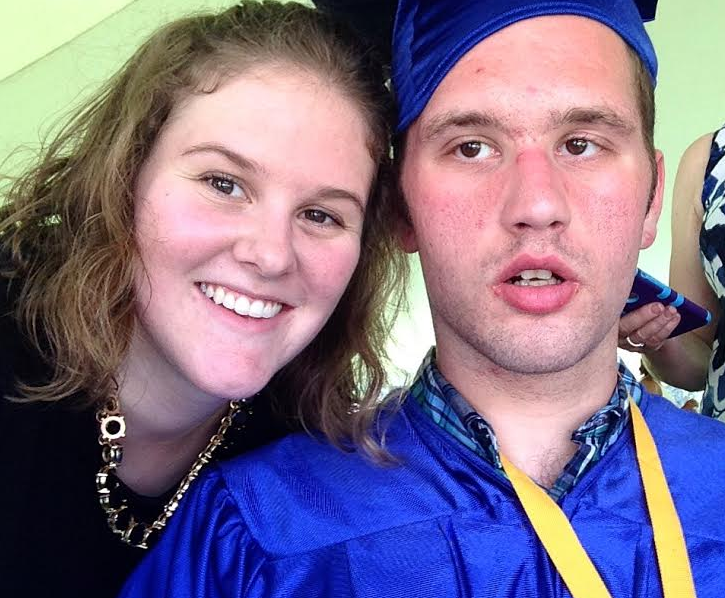Heather Cassano is a documentary filmmaker whose work spans multiple media platforms. She has presented her work in the form of installation art and documentary film, with recent exploration into online interactive media. Heather is originally from Maryland, but has been heavily influenced by her time studying cinema and photojournalism in North Carolina and Copenhagen. Her films are reminiscent of the direct cinema movement, adopting a patient, invested approach with her subjects. Her most recent work is deeply personal, focusing on her younger brother who was diagnosed with autism at the age of two.
Heather’s most recent film, BRIAN, highlights her brother Brian’s recent transition out of the school system and into the confusion of the adult world. The film is about this process and exploring what it means to be an adult with autism in our society. The goal of her film is to raise awareness about the lack of resources for adults with autism, while simultaneously exploring Brian’s personality beneath his autism. She is currently fundraising for this film on Kickstarter (click here to contribute). We invite you to view the film trailer and an exclusive interview with the director below. As a filmmaker, sibling, and member of the autism community, Heather has tremendous wisdom to impart.

MHAF: Tell us about your brother. Who is Brian, and what is he like?
Cassano: Brian is a really sweet guy with a lovable personality. He’s funny and sometimes tries to play jokes on me and my parents. He loves hugs and makes a lot of eye contact when he’s focused on you – something that is not common in many autistic people. He loves spending time in the water – the bath, the pool, etc. – it really relaxes him. I find that it’s easiest to connect with Brian after he has a shower or goes swimming. The water seems to calm his autistic behaviors and makes room for his personality to shine through.
Brian is not very verbal – only able to speak a few words that are mostly food related – so, his biggest challenge is getting people to understand him. He also doesn’t use any communications assistance devices well. My biggest challenge as a sibling is to advocate for Brian to participate in activities that he wants to do. Brian’s quality of life is a huge issue now that he’s living on his own, and it’s important for me to keep trying to figure out what Brian wants out of life and to help make that happen for him. A lot of people, including caretakers and my parents sometimes, struggle to see past Brian’s autism and don’t always consider his personality underneath the autism.

MHAF: What has it been like growing up with a brother on the autism spectrum?
Cassano: Growing up with an autistic brother, I often found that I was left to figure things out on my own because my parents had their hands full with Brian. I grew up to be fiercely independent and able to advocate for the things I need. I attribute a lot of my success thus far to the skills I learned growing up with a special needs sibling.
Yet, growing up with an autistic sibling can be very trying at times. Brian’s autism is very severe, so my dad was forced to quit his job to become a stay-at-home with Brian when he was diagnosed at 2 years old. We were still able to go out as a family (Me, Mom, Dad, and Brian) until Brian hit puberty, and his behavior deteriorated a lot. Brian’s obsessions and anxieties when those routines were interrupted were so bad that he was often violent towards the people around him. My parents were unable to find a a high school that was capable of taking on his behavioral issues, and he was expelled from several schools in Maryland. We were finally able to get Brian placed in a residential school in Delaware (Advoserv) that specialized in this type of behavioral correction. He graduated from there just last year after turning 21. His behaviors are a lot better, and he is now able to participate in a day and residential program with the ARC of Baltimore. He currently lives in a house with another special needs roommate and 24-hour staff support.
MHAF: What inspired your idea for the film BRIAN?
Cassano: I came up with the idea for this film in 2013 when I attended a workshop with filmmaker Alan Berliner at Full Frame Documentary Film Festival. He makes personal documentaries (something I hadn’t considered before), and hearing him speak about his process and ideas motivated me to make this film about my brother. In June 2015, Brian aged out of the school system and was forced to transition to adult services, an event that served as the catalyst for the production of this film. After filming his transition and the summer that followed, I began the editing process. I am shooting more this summer and expect to be finished editing in April 2017.
The main point of the film is to show a different side of autism than is typically portrayed in the media. I have yet to see an accurate representation of what it’s like for the majority of autistic adults living out day-to-day experiences. Most media portrayals focus on overcoming one’s autism, a high functioning savant, or the parents of caretakers of the person with autism. My goal is show Brian’s personality beneath his autism and break down stereotypes in the public’s perception of autism. You can find more detailed information in the text on the Kickstarter page!

Photo Credit: Al Drago
MHAF: How has your family and caregivers helped your brother through his transition to adulthood, and how has everyone, especially Brian, handled it?
Cassano: My family basically had to create the program that Brian is currently in. Before this, there weren’t any programs designed for adults with severe autism. My parents applied to many places on behalf of Brian and were refused admission. So, they worked with the ARC of Baltimore to create a flagship program for autistic adults. Brian lives with a roommate (who was also his roommate at Advoserv), and goes to his day program with two other autistic adults. There were obviously a few bumps in the transition, but overall, I think he has adjusted very well. The program is a bit chaotic, so Brian is sometimes frustrated by the change in activities and people that work with him. It is not the best-case scenario, but it is the best program that exists right now. My hope is to improve the program as Brian gets older and tailor it more specifically to his wants and needs. My parents, especially my dad, almost had a harder adjustment than Brian. They are empty-nesters now, and had some difficulty letting go and allowing Brian to have his own life separate from them. It has, however, been really good for everyone since my parents are now able to enjoy activities as a couple, instead of one person always staying at home with Brian.
The most important takeaway, though, is that none of this would have happened without familial advocacy. There were no programs in place willing to take Brian when he graduated, and who knows where he would be now without us advocating for him. My mom and dad still schedule Brian’s weekend activities with things they think he might enjoy, oversee his medical care, buy him new clothes and things for the house, and make suggestions for additions to the day program. Without the advocacy of his family, Brian is helpless – a theme I will be introducing into the film.
MHAF: What is the greatest lesson you’ve learned as Brian’s sister?
Cassano: I think the most important lesson I’ve learned as a sibling is about the importance of familial advocacy. I used to not want to be involved in my brother’s care, but seeing it from a closer perspective through the making of this film has made me want to be as involved as possible.
MHAF: What are your greatest hopes for your brother? Do you have any fears about his future?
Cassano: I want Brian to be able to live a fulfilled life doing the activities that he wants to do. I want him to continue to be open to new experiences and continue to interact with both disabled and neurotypical peers. My greatest fear is that Brian will revert to his old violent behaviors, and that will cause him to be kicked out of the program he’s currently in. Not only that, but Brian is not himself when consumed by his autistic behaviors. He is unable to focus on anything or interact with anyone and that creates a very lonely life. I’m hopeful that he will continue to push through his autism and enjoy life.

MHAF: If you could teach society one thing about autism, what would it be?
Cassano: Neurotypical society really needs to understand that people with autism are just that – people. I often run into situations when a person sees Brian only for his autism. Brian and his aids have been asked to leave public places for making so much noise. People have stared at him for holding his parents’ or aids’ hand for comfort, and it’s often hard to integrate Brian into society. The high-functioning stereotypes so often portrayed through the media are definitely contributing to this, as people expect “autism” to mean something that it doesn’t. While there are subsets of the autism community that feel differently, my brother’s autism is not an eccentricity or a simple diversity in thinking. It’s a disability. It does not define his personality, and it should be treated as such.
MHAF: What do you think is the single most important thing that society can do to best support adults on the spectrum?
Cassano: An increase in funding for programs for adults with autism would be a huge step towards improving the lives of so many people. There simply isn’t enough funding for the quality of life that Brian should have. Brian get’s something like $700 a month from the government to live on. In most places that isn’t even enough to pay rent on a one-bedroom apartment. With no potential for a job and a need for one-on-one support, Brian is stuck. Caring for a person with special needs should not be a minimum wage job. It should be a career that a caring person might want to enter. An increase in funding would ensure a higher quality of life for people with special needs and attract skilled aids and caretakers. It would also increase the availability of adult programs, which is much needed as there are many adults who still live with their parents or siblings.
Aside from that, people can work towards being more accommodating to autistic individuals. If you own a small business like a restaurant or movie theater, make the room less loud, and provide a safe space for an autistic person to go if they are feeling overwhelmed. Be flexible with the menu if someone has dietary restrictions, and be kind to parents and caretakers dealing with meltdowns. And for people encountering a person with autism out in public, be helpful and kind instead of just staring because the autistic person isn’t conforming to neurotypical societal norms. It’s important to remember that a person with autism is still a human who wants to connect and live in this world just as we do.


 AUTHOR AND EDITOR
AUTHOR AND EDITOR You Aut to Know | A Voice for a Choice: How Offering Choices Helps Those with Autism
You Aut to Know | A Voice for a Choice: How Offering Choices Helps Those with Autism



Hi Heather,
Thank you for making this documentary about your brother Brian. I know exactly how you and your parents feel when it comes to the misunderstanding, the lack of programs, and the need to bring awareness to people regarding Autism, and how it individuals with Autism are not understood or really recognized as people with a disability. My daughter Melisa was born with Autism, and she is also an adult with no future. There are no work programs, to assist with her needs to learn a trade, no independent living programs, to help her become independent, and just like Brian, she is not a completely high functional Autistic. With Occupational therapy, Melisa was able to control some of her body gestures, and with speech therapy she is able to speak, but her learn curve is that of a mid-to-lo functioning Autistic. She going to be 30 Years old in 2018, and my fears are getting worse because I am getting older, my health isn’t actually the best, and I am scared what will happen to her when I pass away. I have turned over every rock and found no resources or answers for her future. I wish I can donate towards your documentary, but I can’t at this time because I am currently unemployed, but I hope to in the near future. But I will pass the message, and maybe I can get some friends and family to donate. I hope to see this documentary, and maybe show it to Melisa. I think she would appreciate the fact that she is not the only one who has fallen between the cracks of society fully comprehending Autism and the levels on the spectrum. Please feel free to keep me update, I would really like to hear how Brian is doing. He seems like such a sweetheart. God Bless you for loving him the way you do.
Sincerely,
Helen Flora